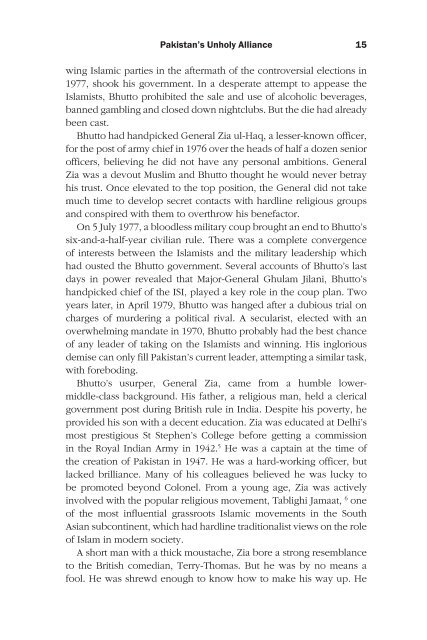Frontline Pakistan : The Struggle With Militant Islam - Arz-e-Pak
Frontline Pakistan : The Struggle With Militant Islam - Arz-e-Pak
Frontline Pakistan : The Struggle With Militant Islam - Arz-e-Pak
You also want an ePaper? Increase the reach of your titles
YUMPU automatically turns print PDFs into web optimized ePapers that Google loves.
<strong><strong>Pak</strong>istan</strong>’s Unholy Alliance<br />
wing <strong>Islam</strong>ic parties in the aftermath of the controversial elections in<br />
1977, shook his government. In a desperate attempt to appease the<br />
<strong>Islam</strong>ists, Bhutto prohibited the sale and use of alcoholic beverages,<br />
banned gambling and closed down nightclubs. But the die had already<br />
been cast.<br />
Bhutto had handpicked General Zia ul-Haq, a lesser-known officer,<br />
for the post of army chief in 1976 over the heads of half a dozen senior<br />
officers, believing he did not have any personal ambitions. General<br />
Zia was a devout Muslim and Bhutto thought he would never betray<br />
his trust. Once elevated to the top position, the General did not take<br />
much time to develop secret contacts with hardline religious groups<br />
and conspired with them to overthrow his benefactor.<br />
On 5 July 1977, a bloodless military coup brought an end to Bhutto’s<br />
six-and-a-half-year civilian rule. <strong>The</strong>re was a complete convergence<br />
of interests between the <strong>Islam</strong>ists and the military leadership which<br />
had ousted the Bhutto government. Several accounts of Bhutto’s last<br />
days in power revealed that Major-General Ghulam Jilani, Bhutto’s<br />
handpicked chief of the ISI, played a key role in the coup plan. Two<br />
years later, in April 1979, Bhutto was hanged after a dubious trial on<br />
charges of murdering a political rival. A secularist, elected with an<br />
overwhelming mandate in 1970, Bhutto probably had the best chance<br />
of any leader of taking on the <strong>Islam</strong>ists and winning. His inglorious<br />
demise can only fill <strong><strong>Pak</strong>istan</strong>’s current leader, attempting a similar task,<br />
with foreboding.<br />
Bhutto’s usurper, General Zia, came from a humble lowermiddle-class<br />
background. His father, a religious man, held a clerical<br />
government post during British rule in India. Despite his poverty, he<br />
provided his son with a decent education. Zia was educated at Delhi’s<br />
most prestigious St Stephen’s College before getting a commission<br />
in the Royal Indian Army in 1942. 5 He was a captain at the time of<br />
the creation of <strong><strong>Pak</strong>istan</strong> in 1947. He was a hard-working officer, but<br />
lacked brilliance. Many of his colleagues believed he was lucky to<br />
be promoted beyond Colonel. From a young age, Zia was actively<br />
involved with the popular religious movement, Tablighi Jamaat, 6 one<br />
of the most influential grassroots <strong>Islam</strong>ic movements in the South<br />
Asian subcontinent, which had hardline traditionalist views on the role<br />
of <strong>Islam</strong> in modern society.<br />
A short man with a thick moustache, Zia bore a strong resemblance<br />
to the British comedian, Terry-Thomas. But he was by no means a<br />
fool. He was shrewd enough to know how to make his way up. He<br />
1













